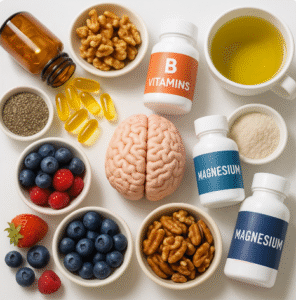Enhance Your Cognitive Performance with Omega-3 Fatty Acids: The Ultimate Resource
Maintaining and optimising brain health is crucial for overall wellness, especially as we navigate through different life stages. While following a nutritious diet and engaging in an active lifestyle are essential for cognitive stability, targeted supplements can significantly enhance this effort. Among various supplements, Omega-3 fatty acids, antioxidants, and probiotics stand out for their potential to boost memory, focus, and mental clarity. This extensive guide is designed to delve into the most effective supplements for improving brain health, pinpoint reputable suppliers within the UK, and furnish practical advice for seamlessly integrating these supplements into your everyday life.
Reputable UK Suppliers for Cognitive Health Supplements: Your Go-To Shopping Guide
When searching for supplements for brain health, it is imperative to select products from trusted and reliable sources to ensure their quality and effectiveness. In the UK, several companies have built a strong reputation by adhering to rigorous standards and focusing on scientifically validated formulations, guaranteeing customer satisfaction and product efficacy.
Biocare stands out as a premier brand that provides an extensive array of brain health supplements, including specialised formulations abundant in Omega-3 fatty acids, B vitamins, and magnesium. Known for their commitment to research and practitioner-driven product development, Biocare supplements are frequently recommended by healthcare professionals due to their proven effectiveness in bolstering cognitive health and promoting overall wellness.
Another notable player in the supplement market is Cytoplan, a UK-based company that prioritises food-based supplements and ethical sourcing practices. Cytoplan offers a remarkable selection of brain health supplements, featuring comprehensive multinutrient blends designed to enhance cognitive function, memory, and mental clarity. Their products are supported by decades of research and are particularly popular among those seeking high-quality, bioavailable nutrients.
For individuals seeking a globally-minded option that delivers exceptional value, LiveGood provides a subscription-based service that offers premium-quality supplements at accessible prices. LiveGood meticulously selects ingredients to formulate brain health supplements that enhance mental performance, focus, and long-term cognitive vitality. Their commitment to transparency and affordability makes them an attractive choice for individuals prioritising both health and cost-effectiveness.
By sourcing supplements from reputable companies such as Biocare, Cytoplan, and LiveGood, consumers can feel assured that they are investing in products that effectively and responsibly support their brain health.
Unveiling the Cognitive Benefits of Omega-3 Fatty Acids
Extensive scientific research has established a strong connection between Omega-3 fatty acids and brain health. Studies indicate that these essential fats are vital for maintaining peak cognitive function. In particular, EPA (eicosapentaenoic acid) and DHA (docosahexaenoic acid) are fundamental components of neuronal membranes, playing a crucial role in the formation and functioning of neurons, which are essential for effective communication within the brain.
Research shows that Omega-3 supplementation can significantly improve memory and cognitive function, especially in older adults and those experiencing cognitive decline. Moreover, Omega-3s are recognised for their ability to reduce inflammation in the brain, potentially lowering the risk of neurodegenerative diseases such as Alzheimer's disease. Given the brain's vulnerability to oxidative stress and inflammation, ensuring adequate Omega-3 intake can serve as a proactive strategy for preserving cognitive health over time.
Essential Guidelines for Optimal Omega-3 Dosage: Key Information You Should Know
Health organisations such as the British Heart Foundation recommend that adults aim for a daily intake of approximately 450mg of combined EPA and DHA. This daily target can be achieved through a combination of dietary sources, such as fatty fish, along with supplementation. For individuals who find it challenging to consume enough fatty fish regularly, Omega-3 supplements offer a convenient alternative.
It is crucial to understand that while supplements can aid in reaching the recommended intake, they should not replace a balanced diet. Instead, they are meant to complement a diverse diet rich in fruits, vegetables, whole grains, and lean proteins. Before starting any new supplementation regimen, individuals should consult healthcare professionals to determine the appropriate dosage tailored to their specific health needs.
Understanding the Role of Omega-3 in Promoting Cardiovascular Health
The benefits of Omega-3 fatty acids extend far beyond cognitive enhancement; they also play a vital role in supporting cardiovascular health. Numerous studies have demonstrated that Omega-3s can effectively lower triglyceride levels, reduce blood pressure, and decrease the risk of heart disease. This multifaceted impact on heart health is particularly significant in the UK, where cardiovascular disease remains a leading cause of morbidity and mortality.
By improving blood flow and reducing inflammation in the arteries, Omega-3s contribute to enhanced overall cardiovascular function. Therefore, incorporating Omega-3 supplements into a health-conscious lifestyle—alongside regular physical activity and a balanced diet—can significantly benefit both brain and heart health, fostering a holistic approach to overall well-being.
The Essential Role of Vitamin B Complex in Cognitive Support and Stability
Examining the Different Types of B Vitamins and Their Unique Functions
The B vitamin family comprises several essential nutrients that are critical for maintaining brain health, particularly B6 (pyridoxine), B12 (cobalamin), and B9 (folic acid). Each of these vitamins plays a unique and indispensable role in supporting neuronal health and cognitive performance, highlighting the importance of ensuring a well-rounded intake of these vital nutrients. In the UK, B vitamins are readily available in various supplement forms, from standalone capsules to complex formulations that combine multiple B vitamins for enhanced effectiveness.
While many individuals may opt to supplement their diets with B vitamins, these essential nutrients can also be found abundantly in everyday foods. For instance, B6 is prevalent in poultry, fish, potatoes, and non-citrus fruits, whereas folic acid can be sourced from dark leafy greens, legumes, and fortified cereals. Vitamin B12, crucial for preserving nerve health, is primarily found in animal products such as meat, dairy, and eggs, making it especially important for vegetarians and vegans to consider fortified foods or supplements to ensure they meet their nutritional requirements.
The Vital Impact of B Vitamins on Cognitive Health and Well-Being
Research indicates that B vitamins play a crucial role in supporting cognitive function and may contribute to preventing mental decline as we age. Specifically, B12, B6, and B9 work synergistically to lower homocysteine levels, as elevated homocysteine, an amino acid, is linked to an increased risk of dementia and Alzheimer's disease.
By maintaining homocysteine levels within a healthy range, these vitamins can significantly promote superior brain health. Additionally, they contribute to improved memory performance. B vitamins are also essential for synthesising neurotransmitters, the chemical messengers that facilitate communication between nerve cells. This function is particularly significant for mood regulation and memory, thereby directly linking B vitamin intake to enhanced mental health.
Conditions such as anxiety and depression are increasingly prevalent in the UK. Ensuring an adequate intake of B vitamins is a fundamental aspect of maintaining cognitive wellness and emotional stability.
Identifying Dietary Sources of B Vitamins Readily Available in the UK
Incorporating sufficient B vitamins into one’s diet can be straightforward with the right food choices. The UK boasts a variety of dietary sources that are rich in these vital nutrients. Fortified breakfast cereals offer a convenient method to increase B vitamin intake, particularly beneficial for individuals striving to meet their daily requirements.
Animal-based foods also serve as excellent sources of B vitamins. A traditional English breakfast featuring eggs, bacon, and baked beans can significantly enhance B vitamin intake. However, vegetarians and vegans must pay extra attention to their dietary choices, as plant-based sources of vitamin B12 are limited. Fortified plant milks and nutritional yeast can serve as valuable alternatives, helping to address any nutritional gaps and ensure adequate B12 intake.
Harnessing Antioxidants: Shield Your Brain from Damage
Recognising Common Antioxidants Found in Dietary Supplements
Antioxidants are compounds that protect the body from oxidative stress caused by free radicals, and their significance in brain health cannot be overstated. Common antioxidants found in supplements available in the UK include vitamins C and E, alongside various flavonoids. 
These dietary supplements work to neutralise free radicals, thereby protecting brain cells from damage that may contribute to cognitive decline.
Individuals can acquire antioxidants through supplements; however, they can also be found in abundance within a healthy diet.
A vibrant array of colourful fruits and vegetables provides excellent sources of these protective compounds. Berries, citrus fruits, and leafy greens rank among the best choices for boosting antioxidant intake.
Choosing a diet rich in antioxidants not only supports brain health but also enhances overall well-being by promoting various bodily functions.
Understanding How to Protect Against Oxidative Stress
The brain is particularly susceptible to oxidative stress, which can lead to inflammation and cell death. Antioxidants counteract this by neutralising free radicals, potentially slowing cognitive decline and protecting against neurodegenerative diseases. Research indicates that diets abundant in antioxidants correlate with improved mental function and a reduced risk of conditions such as Alzheimer’s and dementia.
Notably, studies have demonstrated that individuals with higher intakes of vitamin E, commonly found in nuts and seeds, exhibit slower cognitive decline in comparison to those consuming lower amounts. Similarly, vitamin C, a powerful antioxidant present in numerous fruits and vegetables, has been associated with enhanced mental performance.
Identifying Foods Rich in Antioxidants: Top Choices for Your Diet
For those aiming to increase their antioxidant intake through dietary choices, a plethora of options are readily available in UK supermarkets. Berries, such as blueberries, strawberries, and blackberries, not only taste delightful but are also nutrient-dense and rich in antioxidants. Nuts, particularly walnuts and pecans, serve as another excellent source, providing healthy fats alongside their antioxidant benefits. Furthermore, green tea, a popular beverage option in the UK, is rich in flavonoids, making it an outstanding addition to a brain-boosting diet.

Berries full of antioxidants
Incorporating these antioxidant-rich foods into daily meals can significantly enhance overall health while providing specific benefits to brain function. For instance, starting the day with a smoothie packed with berries and spinach can establish a positive foundation for cognitive health throughout the day.
Exploring the Connection Between Antioxidants and Skin Health
While the primary focus here is on brain health, antioxidants also play a vital role in maintaining skin health. Vitamins C and E are frequently included in skincare products due to their ability to shield the skin from UV damage and help reduce signs of aging.
Adopting a diet rich in antioxidants nurtures not only the brain but also promotes youthful, radiant skin, thereby providing a dual-purpose strategy for health and beauty.
Utilising both dietary sources and topical applications presents comprehensive benefits, supporting cognitive well-being and overall skin health, ultimately enhancing confidence and vitality.
Herbal Supplements: Nature’s Companions for Cognitive Enhancement
Exploring the Cognitive Advantages of Ginkgo Biloba

Ginkgo biloba is a widely-used herbal supplement in the UK, renowned for its potential to enhance cognitive function. Traditionally employed in Chinese medicine, ginkgo is believed to improve blood circulation to the brain, which may subsequently bolster memory and cognitive abilities.
Research suggests that ginkgo may be particularly beneficial for older adults experiencing memory issues or cognitive decline. Some studies indicate that ginkgo can enhance cognitive function in individuals with dementia; however, results remain mixed, and further studies are necessary to definitively establish these benefits.
Individuals considering ginkgo biloba supplements should explore reputable brands available at health stores throughout the UK. As with any supplement, it is advisable to consult a healthcare professional prior to starting a new regimen to ensure that it aligns with personal health conditions.
Unlocking the Cognitive Potential of Bacopa Monnieri
Bacopa monnieri is another herbal supplement that is gaining popularity in the UK for its cognitive-enhancing properties. This ancient herb is primarily used in Ayurvedic medicine to improve memory and reduce anxiety. Research indicates that bacopa may enhance cognitive function, particularly in memory recall and learning.
Studies suggest that bacopa can help alleviate anxiety, making it an appealing option for individuals seeking to boost cognitive performance while managing stress. Bacopa is available in various forms, including capsules and powders, which makes it easy to integrate into daily routines.
Similar to ginkgo, it is essential for individuals to consult a healthcare professional before starting bacopa supplementation, particularly for those on medication or who have existing health conditions.
Understanding the Safety and Regulation of Herbal Supplements
In the UK, the Medicines and Healthcare Products Regulatory Agency (MHRA) oversees the regulation of herbal supplements, including products like ginkgo biloba and Bacopa monnieri. This regulatory framework ensures that these products meet safety and quality standards, providing consumers with increased confidence in their choices.
However, while regulation offers a limited degree of safety assurance, consumers should still conduct thorough research regarding the products they choose.
Purchasing supplements from reputable sources and carefully reading product labels can help ensure the quality and efficacy of the supplements.
Exploring the Cognitive Benefits of Turmeric: A Superfood for Brain Health

Turmeric, a vibrant yellow spice commonly found in health food stores across the UK, is celebrated for its anti-inflammatory properties and potential benefits for brain health.
The active compound in turmeric, curcumin, has garnered considerable attention due to its antioxidant effects and possible role in protecting against neurodegenerative diseases.
Research suggests that curcumin may help improve mood, reduce inflammation, and even enhance cognitive function. For those seeking to incorporate turmeric into their diets, consider adding it to curries, soups, or smoothies. Turmeric supplements are also widely available for those seeking concentrated doses.
As with any supplement, it is advisable to consult with a healthcare provider before starting turmeric supplementation, especially for individuals with existing health issues or those taking medications that may interact with turmeric.
Magnesium: The Essential Mineral for Enhanced Cognitive Function
Understanding the Importance of Magnesium in Supporting Brain Health
Magnesium is a vital mineral that plays an integral role in brain function, supporting neurotransmitter actions and nerve transmission. This essential mineral is crucial for regulating mood and enhancing cognitive performance. Adequate magnesium levels can improve learning abilities, memory retention, and overall brain health. In the UK, magnesium deficiency is a prevalent concern, leading to symptoms such as fatigue, muscle cramps, and potential cognitive impairment. Given its pivotal role in supporting cognitive function, ensuring sufficient magnesium intake should be a priority for anyone focused on brain health.
For individuals struggling to meet their magnesium needs through diet alone, supplementation offers a viable option. Magnesium supplements are available in various forms, including tablets and powders, making it easy to find the right choice for personal preferences.
Recognising the Signs of Magnesium Deficiency: Key Indicators to Watch For
The symptoms associated with magnesium deficiency can significantly impact daily life, ranging from fatigue and irritability to muscle cramps and cognitive difficulties. Many individuals in the UK may be unaware that they are not meeting their magnesium requirements, potentially leading to more severe symptoms over time.
Cognitive impairment is particularly concerning, as it can hinder memory, attention, and overall mental clarity. By being aware of the signs of magnesium deficiency, individuals can take proactive steps to enhance their intake, whether through dietary adjustments or supplementation.
Individuals experiencing symptoms should consult with a healthcare professional to determine whether magnesium deficiency is a contributing factor and to develop an appropriate strategy for optimisation.
Identifying Dietary Sources of Magnesium Available in the UK
 Fortunately, magnesium-rich foods are widely available in the UK, making it relatively straightforward to boost intake through a balanced diet. Leafy greens, such as spinach and kale, are excellent sources, as are nuts and seeds, particularly almonds and pumpkin seeds. Whole grains, such as brown rice and quinoa, also contribute significantly to daily magnesium needs.
Fortunately, magnesium-rich foods are widely available in the UK, making it relatively straightforward to boost intake through a balanced diet. Leafy greens, such as spinach and kale, are excellent sources, as are nuts and seeds, particularly almonds and pumpkin seeds. Whole grains, such as brown rice and quinoa, also contribute significantly to daily magnesium needs.
For those aiming to enhance their magnesium intake, consider incorporating salads rich in leafy greens, nut-based snacks, and whole-grain options into meals. By prioritising these foods, individuals can support both cognitive function and overall well-being while enjoying a diverse and flavourful diet.
Probiotics: Strengthening the Connection Between Gut Health and Brain Function
Understanding the Gut-Brain Axis: The Intricate Link Between Digestive and Cognitive Health
Emerging research continues to illuminate the complex relationship between gut health and brain function, commonly referred to as the gut-brain axis. Probiotics, which are beneficial bacteria that promote gut health, have gained recognition for their potential to enhance cognitive function and emotional well-being.
In the UK, probiotics are readily available in various forms, including capsules, powders, and fermented foods such as yogurt and kefir. These probiotics contribute to maintaining a balanced gut microbiome, which has been associated with improved mood, reduced anxiety, and better cognitive performance.
By integrating probiotics into one’s diet, individuals may experience positive effects on both gut health and brain function, supporting overall mental clarity and emotional stability.
Exploring Different Probiotic Strains and Their Unique Benefits

Different probiotic strains offer various health benefits. Lactobacillus and Bifidobacterium are among the most commonly found strains in UK supplements.
These strains support digestive health and promote nutrient absorption while contributing to maintaining a balanced gut microbiome.
Research indicates that Lactobacillus and Bifidobacterium strains may also influence brain health, helping to reduce inflammation and promote the production of neurotransmitters.
The gut plays a critical role in mental health. Ensuring a diverse intake of probiotic strains can enhance both cognitive and emotional well-being.
For those interested in exploring the benefits of probiotics, consider incorporating fermented foods or probiotic supplements into your daily routine. As with other supplements, consulting with a healthcare provider is advisable to determine the most suitable strains and dosages for individual needs.
Ensuring the Safety and Efficacy of Probiotics: Making Informed Choices
Generally, probiotic supplements are regarded as safe for most individuals in the UK. However, it is essential for consumers to purchase products from reputable manufacturers to ensure quality and efficacy. While the MHRA regulates supplements, individual brands may vary in formulation and effectiveness. Individuals with existing health conditions or those taking medications should consult a healthcare professional before starting probiotics to guarantee compatibility and safety. By prioritising safety and efficacy, individuals can confidently support their gut health and, in turn, their cognitive function.
Harnessing the Power of Supplements for Optimal Brain Health
Exploring the world of brain health through supplements can be an effective method for enhancing cognitive function and overall wellness. With a diverse array of options available, ranging from Omega-3 fatty acids to probiotics, individuals can tailor their supplement routine to meet their specific health goals.
By understanding the role that each supplement plays and recognising the importance of a balanced diet, individuals can empower themselves to make informed decisions regarding their health. As scientific research continues to evolve, staying updated on new findings can further enhance understanding, leading to more effective strategies for promoting brain health throughout one’s life.
Frequently Asked Questions About Brain Health Supplements: Your Queries Answered
Which supplements provide the greatest benefits for cognitive health?
The most effective supplements for brain health include Omega-3 fatty acids, vitamin B complex, antioxidants, magnesium, and probiotics. Each of these supplements supports cognitive function and overall well-being in unique ways.
How do Omega-3 fatty acids support brain function?
Omega-3 fatty acids are essential for brain function, as they enhance memory and cognitive performance while mitigating inflammation, thus improving overall brain health.
Can vitamin B complex contribute to improved mood?
Yes, vitamin B complex can enhance mood by supporting neurotransmitter function and lowering homocysteine levels, which subsequently reduces the risk of cognitive decline.
What are the best sources of antioxidants?
Foods rich in antioxidants help protect the brain from oxidative stress. Excellent choices include berries, nuts, dark chocolate, and green tea, all of which promote cognitive health.

Are herbal supplements safe for consumption?
Most herbal supplements, including Ginkgo biloba and Bacopa monnieri, are generally regarded as safe when used as directed. Nevertheless, it is advisable to consult a healthcare professional prior to their use.
What is the recommended daily intake of magnesium for adults?
The recommended daily intake of magnesium varies, but adults should aim for approximately 300-400 mg. It is advisable to consult with a healthcare provider for individual recommendations.
How do probiotics benefit brain health?
Probiotics improve gut health, which is closely linked to brain function. They may assist in enhancing mood, reducing anxiety, and improving cognitive performance.
Is it possible to obtain sufficient Omega-3 from dietary sources?
Yes, consuming fatty fish, nuts, seeds, and algae-based products can provide an adequate amount of Omega-3 fatty acids. Supplements can also serve as a practical option if dietary intake is insufficient.
Which foods are abundant in vitamin B12?
Vitamin B12 is primarily found in animal products such as meat, fish, eggs, and dairy. Fortified cereals and plant-based milks are excellent sources for vegetarians and vegans.
How long does it typically take to notice benefits from supplements?
The duration required to experience benefits from supplements varies among individuals and by the specific type of supplement. However, many people may notice improvements within a few weeks to a few months.
Connect with us on Facebook for more insights and tips!
This Article: Enhance Your Cognitive Performance with Omega-3 Fatty Acids: The Ultimate Resource first appeared on https://janestevensnutrition.com
The Article: Support Brain Health with Supplements: Your Essential Guide first appeared on https://janestevens.net
The Article Supplements for Brain Health: Your Essential Guide Was Found On https://limitsofstrategy.com
The Article Brain Health Supplements: The Ultimate Essential Guide found first on https://electroquench.com

